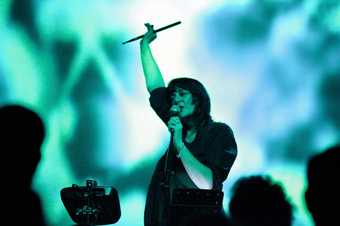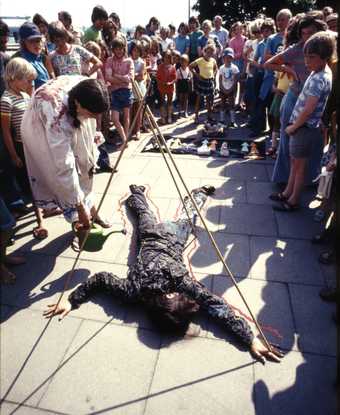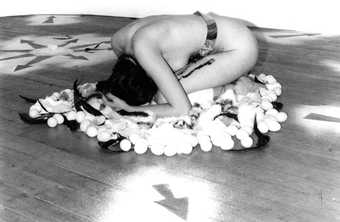
Cosey Fanni Tutti performing as Carter Tutti in 2011
Photo: Ian Cinammon, courtesy Cosey Fanni Tutti
Tate Etc. What came first, art or music?
Cosey Fanni Tutti Music came first, but art was already there. I studied piano when I was at high school and played classical music. My dad used to build radios and circuit boards, so my ear was getting tuned in a very different way at an early age. He’d bought me a tape recorder, and I was experimenting with that. I got thrown out of home in 1969 at 17, so I just had to get on with my life. Then art and music were my life, nothing else.
Tate Etc. Where did your name come from?
CFT It just evolved. I’ve had various nicknames since I was very young. When I met Genesis he would call me Cosmosis, which changed to Cosey. One day, when I was doing mail art, the director of Matt’s Gallery, Robin Klassnik, wrote to me and addressed it Cosey Fanni Tutti – which I later learned means ‘as all women should be’. So it found a place in my life at the right time.
Tate Etc. What was COUM’s initial objective? CFT To have an objective you have to have boundaries, and we didn’t have any. We were all into dada and surrealism, but we had the added advantage that, while our generation rejected our parents’ way of living, we just wanted freedom – freedom of expression, completely. We just bounced ideas around and did whatever we wanted to do. Nothing was off-limits, and that’s what was great about COUM.
Tate Etc. Did what you were doing feel subversive in the moment of its making?
CFT No – the odd thing is that it didn’t. And I think that had a lot to do with the fact that we were isolated in our own world as COUM, as a family. In that situation, you encourage one another to expand on ideas and on yourself – finding and expressing yourself and living your fantasies. When you’ve got that going on 24/7, nothing really seems odd until you take it outside the front door, do it in the street and get arrested.

COUM action Omissions in Kiel, Germany, 1975
Courtesy Cosey Fanni Tutti
Tate Etc. Is the tension between you and the audience a positive one?
CFT Yes, because it’s a shared moment. It creates questions for other people there and for me, and hopefully evokes some kind of discussion and moves things forward a bit. I was always putting myself in a position of discomfort. I’ve always tried to break down certain barriers, like firstly just getting nude in public. It’s quite a big thing. But I guess I was happy being naked, and I was learning about sex and experimenting with sex and my sexuality, so that became part of my art performance actions. Everything went into one: if I was doing music or magazines or the art actions, they all fed into each other, because that’s who I was. I’m this whole person made up of these different parts.
Tate Etc. What does it mean for you to be taking your work back to Hull?
CFT It’s quite funny really, because in the early days we had such a struggle in Hull, even though I don’t think we were really that radical until we got to London. It’s difficult to think now that if you walked down the street in a Day-Glo mac, you would get attacked. It’s mad, but that’s what it was like. Hull people are hard because they’ve had a really tough life. And because I’m from Hull, I’ve an affection for it even though it’s uncompromising. That’s probably why I am who I am, so I’ve got no problem with taking my stuff back there.
Tate Etc. Your forthcoming memoir is called Art, Sex, Music. Why?
CFT They are the three threads of my life. They’re all intertwined. The music has sex in it. The art has sex in it. The sex is the art and the music. So when you asked what came first, it’s in the title: art, then sex, then music.

